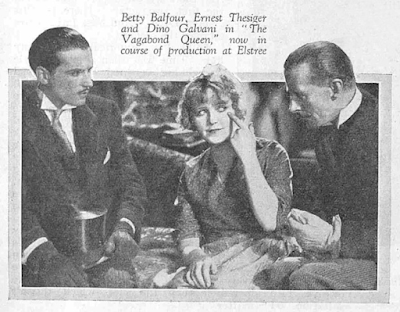And so, to Ruritanian or rather Bolonia where Britain’s
Queen of Happiness finds herself in the unlikely position of being Queen also
of all she surveys in this tiny kingdom sandwiched somewhere between Freedonia,
Graustark and maybe even Dr Victor Werner von Doom’s Latveria. Inspired by the works
of English novelist Anthony Hope, notably The Prisoner of Zenda Ruritania
became the catalyst for many imaginary kingdoms of central and eastern Europe and
a multi-media genre of romantic adventures in which the imagined age of chivalry
and royal circumstance lived on to eventually become the Daily Mail’s Celeb
section covering our own increasingly mythical royal family.
In her learned introduction, the BFI’s Bryony Dixon said
that there were some 250 silent films in this space, some of which had been the
focus of strands at the Giornate del Cinema Muto Pordenone in recent years as
curated by Kelly Robinson and Ingrid Stigsdotter (who’s reflection so Betty
Balfour and the film formed the basis of today’s screening notes). The films
were sometimes serious but always ripe with potential for lampooning which is
exactly where the film sits; a situational comedy with some elements of danger
more there for effect than to provide actual jeopardy.
As you would expect, from the star, the film is charming
and effectively made, with director Géza von Bolváry, who made a number of
films in this country including The Wrecker (1929) and The Ghost
Train, the first adaptation of Arnold Ridley’s play perhaps best known for
the 1941 Arthur Askey remake. Cinematography is from Charles Rosher, Oscar
winner, and possible Anna May Wong paramour – Bryony pointing out that both
came to Britain at the same time – who provides the highest quality of visual
content.
The story was from Douglas Furber whose various musical
plays included The Lambeth Walk (Oi!!) with script from Rex Taylor and Val
Valentine, which has the feel of some compromise. It does contain many fine
moments especially from Our Betty but also from the excellent Ernest Thesiger,
here as Lidoff who is the very the embodiment of world-weary royal secretary.
If looks could kill any number of adversaries would have been disapproved of to
death whilst he sees the multiple threats to the royal family, not just from the
scheming Winkleburg (Harry Terry) but also from their own wistful incompetence –
certainly in the case of the real Princess Zonia’s husband, plastered Prince
Adolphe (Charles Dormer).
 |
| Ernest Thesiger photographs Betty Balfour during a break in filming. (Associated Newspapers/Rex/REX USA) |
All seems so far away as the film opens in London with
Betty playing Sally, a subversive house maid with a soft spot for one of her
landlady’s tenants, the cash-strapped inventor Jimmie (Glen Byam Shaw) who is only
a one-pound battery away from the invention of television. Unable to leave the
house without his return being barred due to his long overdue rent, Sally steps
out to acquire the missing item only for it to be destroyed by local yobbos. As
she exacts a fruity revenge in Pickford fashion pelting them with fruit and veg
from the market stalls, she’s spotted by Lidoff and offered £500 if she’s
willing to stand in for Princess Zonia.
They say never look a gifting diplomat in the mouth but
this is impossible for Sally to resist especially when she takes Jimmie with her
on this trip in space and time. Bolonia is your typical Ruritanian paradise
with chicken and pigs roaming the streets and revolutionaries around every
corner. There are new costumes to wear and a lack of language skills to navigate
– this plastic princess has a very sore throat – which only really becomes and
issue with the shock revelation that Zonia has that husband who, despite his
lack of awareness and visual recognition soon becomes an over amorous issue.
This is nothing though as the real reason for Sally’s
appointment is revealed; she’s there to take the flak – literally – for the
real Zonia and, if required, a bullet or two from Winkleburg’s assassins who
line her route to the palace with menace in a tense/silly/very funny closing sequence.
Stephen Horne provided regally gleeful accompaniment for a
film that was released in both silent and sound synchronised form – Britain on
the cusp of the talkie transition at this moment. It’s hard to imagine the
original music improving on his uncanny syncopation and inventions though.
 |
| From Britannia and Eve, June 1, 1929 |
I’m a king I tell you! – A king!
There was also time from a precious two-reeler from
Charley Chase, Long Fliv the King (1926) as if the Ruritanian location
had not been spoofed enough. No one quite makes fun of things like Charlie
though and here he’s a commoner condemned to death who is married to Princess
Helga of Thermosa (Martha Sleeper) who needs a hubby double quick to claim her
throne. Charlie is reprieved just after their ceremony and is understandably
keen to pursue both Crown and Princess thereby thwarting the schemes of the
evil Hamir of Uvocado, the Prime Minister (Fred Malatesta). There’s also
splendid support from Max Davidson as Charlie’s mate Warfield – painfully Jewish-coded
to modern eyes but full of energy.
It's a grand laugh in the grand duchy and Oliver Hardy is on hand to add that extra dose of comic potency. Both he and Chase demonstrate the innate potency of the best silent comics; you’re smiling as soon as you see them, you know the comedy is coming; their eyes alive with mischief and not a second wasted which is important as the essence of all comedy is, of course… timing!














No comments:
Post a Comment